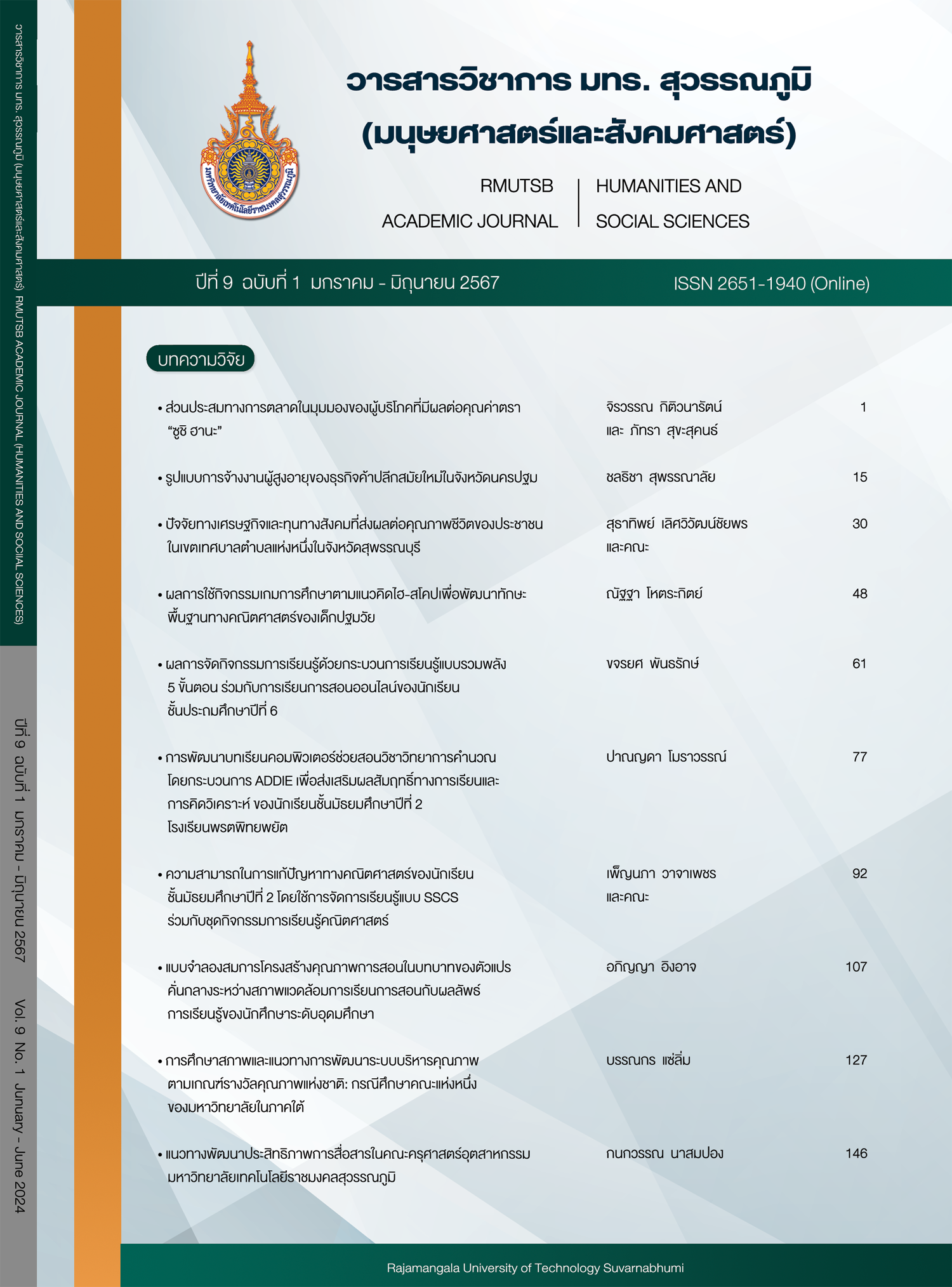The elderly employment form of modern trade in Nakhon Pathom Province
Main Article Content
Abstract
This research aims to study the components of the elderly employment form of modern trade in Nakhon Pathom province, by using qualitative research methodology, and grounded theory. The data was collected by semi-structured interviews and observation forms from 30 key informants which were divided into 4 groups including demand group, supply group, academic group, and other groups of agencies related to the employment of the elderly. The findings found the elderly employment form of modern trade in Nakhon Pathom province included: 1) a company’s employment readiness featured a safety and hygiene system, suitable regulations, and a tangible employment plan, 2) an appropriate hiring plan included job scopes appropriate to age range, a job position consistent with knowledge and physical abilities, and an employment condition that benefit both parties, 3) efficiency reward system consists of appropriated extrinsic cash incentives figure, intrinsic reward system resulting to work happiness, and core values that encourage elder felt self-esteem, and 4) employment success factors included policy, rules, and regulations, and supporting from the government sector and family members to promote elder employment to the private sector.
Article Details

This work is licensed under a Creative Commons Attribution-NonCommercial-NoDerivatives 4.0 International License.
References
Anekjumnongporn, P., & Anekjumnongporn, T. (2020). Adult workers: Opportunity and challenges in human resources management of hospitality business. Journal of Social Sciences Srinakharinwirot University, 23(1), 216-229. (in Thai)
Asavanirandorn, C., Osatis, C., Pechdin, W., Manitsorasak, W., & Jinlanon, N. (2020). Non-standard employment for older persons in the Thai private sector: Flexibility productivity and protection (research report). Bangkok: College of Population Studies, Chulalongkorn University. (in Thai)
Bank of Thailand. (2021). Look at the career trends of the elderly retired but still have electricity, can work. Prasiam BOT Magazine, 2, 32-33. (in Thai)
Barnes, H., Smeaton, D. & Taylor, R.F. (2009). An ageing workforce: the employer's perspective. Brighton: Institute for Employment Studies.
Blau, P. M. (1964). Exchange and power in social life. New York, NY: Wiley.
Bustamam, F. L., Teng, S. S., & Abdullah, F. Z. (2014). Reward management and job satisfaction among frontline employees in hotel industry in Malaysia. Social and Behavioral Sciences, 144, 392-402.
Chantavanich, S. (2010). Qualitative research (18th ed.). Bangkok: Chulalongkorn University Press. (in Thai)
Ciutiene, R., & Railaite, R. (2014). Challenges of managing an ageing workforce. Procedia-Social and Behavioral Sciences, 156, 69-73.
Creswell, J. W. (2007). Qualitative research inquiry and research design: Choosing among five approach (2nd ed.). Thousand Oaks, CA: Sege.
Department of Older Person. (2022). Statistics of the elderly, Thai nationality and whose name is in the household registration, January 2022. Retrieved 8 August 2022, from https://www.dop.go.th/th/know/side/1/1/1159. (in-Thai)
Fabisiak, J., & Prokurat, S. (2012). Age management as a tool for the demographic decline in the 21th century: An overview of its characteristics. Journal of Entrepreneurship, Management and Innovation, 8(4), 83-96.
Jensantikul, N. (2020) Employment of the elderly: principles and practices in public and private sector. Khon Kaen: Faculty of Humanities and Social Sciences, Khon Kaen University. (in Thai)
Khammadee, P. (2017). The causal relationship and effect of elderly workers management capability: An empirical evidence of hotels business in Thailand (Doctoral dissertation). Silpakorn University, Nakhon Pathom. (in Thai)
Lutz, K., Andreas, P., Karin, N., Roger, L., & Lutz, J. (2012). The rewarding value of good motor performance in the context of monetary incentives. Neuropsychological, 50(8), 1739-1747.
Macey, W. H., & Schneider, B. (2008). The meaning of employee engagement. Industrial and Organizational Psychology, 1(1), 3-30.
Meteeworachat, A., & Maharattanasakul, P. (2019) Human resource management for the elderly according to the Buddhist way. Journal of Graduate Review Nakhon Sawan Buddhist College, 7(3), 443-456. (in Thai)
Neuman, W. L. (2003). Social research methods: Qualitative and quantitative approaches (5th ed.). Boston, MA: Pearson Education.
Picchio, M., & Van, O. J. C. (2013). Retaining through training even for older workers. Economics of Education Review, 32, 29-48.
Pinto, S. R., & Nunes, M. D. (2014). Managing an aging workforce: What is the value of human resource management practices for different age groups of worker? Review of Applied Management Studies, 12, 58-66.
Pokapanich, T., Srisorn, W., & Chayanon, S. (2021). The right employment method for the active aging of the elderly in the digital age in Mueang Nonthaburi District, Nonthaburi Province. Journal of Legal Entity Management and Local Innovation, 7(9), 161-174. (in Thai)
Pongnairat, K. (2021). Guidelines for hiring older workers of private sector for supporting the Eastern Economic Corridor (research report). Chonburi: Burapha University.
Potisita, C. (2013). The science and art of qualitative research (6th ed.). Bangkok: Amarin Printing and Publishing. (in Thai)
Pukaew, M. (2022). Elderly person act. Retrieved 16 August 2022, from https://www.parliament.go.th/ewtadmin/ewt/elaw_parcy/ewt_dl_link.php?nid=1536. (in-Thai)
Sadaenghan, P., Ingard, A., & Thanadechawat, N. (2017). The development of elderly employment model in the eastern hotel business of Thailand (research report). Chonburi: Burapha University. (in Thai)
Sarfati, H. (2019). Book review: Technology and the Future of Work: The impact on labour markets and welfare states. International Social Security Review, 72(1), 129-132.
Shirahase, S. (2015). Social inequality among older people in rapidly aging Japan. Research in Social Stratification and Mobility, 41, 1-10.
Suksiri, P. (2022, July 26). Director, Office of Commercial Affairs Nakhon Pathom. (Interview)
Suphanalai, C. (2021). Operation management. Bangkok: Chandrakasem Rajabhat University. (in Thai)
Thailand Board of Investment. (2022). Population statistics. Received 16 August 2022, from https://www.boi.go.th/index.php?page=demographic.
Tippratum, C. (2016). Intrinsic reward of retirees: study for grounded theory. A Proceeding The 41st National and 5th International Graduate Research Conference (pp. 45-56). Pathum Thani: Valaya Alongkorn Rajabhat University under the Rayal Patronage.
Tippratum, C., Kongklay, J., & Jadesadalug, W. (2017). The role of reward in human resource management. Journal of Graduate Studies Valaya Alongkorn Rajabhat, 11(1), 190-201. (in Thai)
Tishman, F. M., Looy, S. V., & Bruyère, S. M. (2012). Employer strategies for responding to an aging workforce (research report). New Brunswick, NJ: NTAR Leadership Center.
Vroom, V. H. (1964). Work and motivation. New York: John Wiley & Sons.


